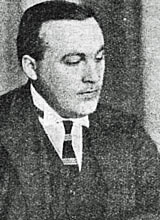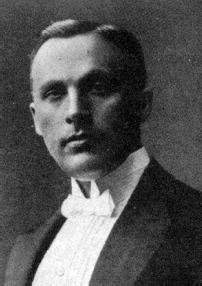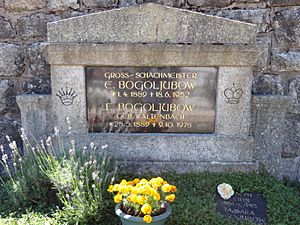Efim Bogoljubow facts for kids
Quick facts for kids Efim Bogoljubow |
|
|---|---|

Bogoljubow in 1925
|
|
| Full name | Yefim Dmitriyevich Bogolyubov |
| Country | Russian Empire → Soviet Union Germany |
| Born | April 14, 1889 Stanislavchyk, Tarashcha Uyezd, Kiev Governorate, Russian Empire (now Kyiv Oblast, Ukraine) |
| Died | June 18, 1952 (aged 63) Triberg im Schwarzwald, West Germany |
| Title | Grandmaster (1951) |
Efim Bogoljubow was a famous chess player. He was born in Russia in 1889 and later became a German citizen. He is best known for playing two matches for the World Chess Championship against Alexander Alekhine. In 1951, he received the special title of Grandmaster from FIDE, the world chess organization.
Contents
Learning Chess and Early Games
Bogoljubow started learning chess when he was 15 years old. He became very serious about the game at 18. His father was a priest, and Efim first thought about becoming one too. He studied theology, but then decided to focus on chess instead.
In 1911, he shared first place in the Kiev championships. The next year, he took second place in a tournament in Vilnius. In 1913, he played in a big Russian championship in Saint Petersburg.
Life During World War I
In 1914, Bogoljubow was playing in a chess tournament in Germany. World War I suddenly started, and he and other Russian players were held in Germany. They could not go back home.
While interned, they played many chess tournaments. Bogoljubow won five of these events. During this time, he met Frieda Kaltenbach. They got married in 1920 and had two daughters. Bogoljubow lived most of his life in Germany after this.
Becoming a Chess Champion
After the war, Bogoljubow won many international tournaments. He won in Berlin, Stockholm, and Kiel. In 1923, he shared first place in Karlsbad. He used his prize money to buy a house in Triberg, where his family rented rooms to visitors.
In 1924, Bogoljubow went back to Russia, which was now the Soviet Union. He won the Soviet chess championships in 1924 and 1925. He also won a big tournament in Moscow in 1925. Famous players like Emanuel Lasker and José Raúl Capablanca were there. This made him the only player to be both German and Soviet champion in the same year.
World Championship Challenges
In 1926, Bogoljubow moved back to Germany. After this, his name was not allowed to be mentioned in the Soviet Union. He continued to win many tournaments. In 1928, he won a strong tournament in Kissingen. He beat players like Capablanca and Aron Nimzowitsch.
Bogoljubow played two matches for the World Chess Championship against Alexander Alekhine. He lost both matches, first in 1929 and again in 1934.
In 1931, he played for Germany in the Chess Olympiad. He won a silver medal for his great performance.
When the Nazis came to power in Germany, Bogoljubow faced challenges. He was not allowed to play for the German national team. He joined the Nazi party in 1938 so his daughters could go to university. He also coached the German national chess team.
Chess During World War II
During World War II, Bogoljubow continued to play chess. He played in many tournaments held in Germany. He even played a short match against Alekhine in 1943. Bogoljubow also helped train younger chess players like Klaus Junge and Wolfgang Unzicker.
Later Years and Recognition
After the war, Bogoljubow lived in West Germany. He was allowed to play in German championships again. Even though he was older, he still won some tournaments. He won in Lüneburg and Kassel in 1947. In 1949, he won the West German championship.
In 1950, the World Chess Federation (FIDE) did not give him the title of International Grandmaster. This was partly due to political reasons. But after many protests from Western countries, FIDE gave him the title in 1951.
Bogoljubow passed away peacefully in his sleep in 1952 at the age of 63. Years later, his name was officially recognized again in the Soviet Union.
His Chess Legacy
A chess opening is named after him. It is called the Bogo-Indian Defence. It starts with the moves 1.d4 Nf6 2.c4 e6 3.Nf3 Bb4+.
Bogoljubow was known for some famous quotes:
- "When I am White I win because I am White. When I am Black I win because I am Bogoljubow." (His last name, Bogoljubow, means "beloved by God" in Russian.)
- "To have a knight planted in your game at K6 (e3/e6) is worse than a rusty nail in your knee."
See also
 In Spanish: Yefim Bogoliúbov para niños
In Spanish: Yefim Bogoliúbov para niños
 | John T. Biggers |
 | Thomas Blackshear |
 | Mark Bradford |
 | Beverly Buchanan |



